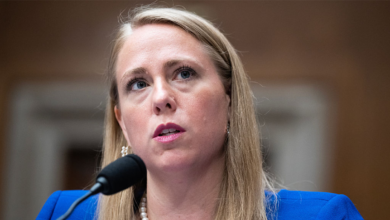Erdogan fuels the judicial crisis and calls for a new constitution

ANKARA (Reuters) – Turkish President Tayyip Erdogan on Friday waded into a brewing judicial crisis, calling for a new constitution to resolve an unprecedented standoff between two of the country’s top courts, while his opponents They were marching in Ankara.
The comments fueled a debate over the rule of law that erupted on Wednesday when the Court of Cassation of Appeals filed a criminal complaint against judges at the Constitutional Court, who ruled last month that jailed MP Can Atalay should be freed.
In a twist that critics said highlighted the deteriorating state of Turkey’s legal system, the top appeals court said the Constitutional Court’s ruling was unconstitutional. Legal experts say the next steps in resolving the unprecedented standoff between the two courts are difficult to predict.
“Unfortunately, the Constitutional Court has made many mistakes in a row at this time, which seriously saddens us,” Erdogan told reporters on a flight back from Uzbekistan, according to a text published by his office on Friday.
Turkey’s bar association and main opposition party, CHP, denounced the appeals court’s move as an “attempted coup” and hundreds of members demonstrated, many of them lawyers dressed in legal robes, chanting “justice” in the streets of the capital on Friday.
They marched more than 10 kilometers from the Ankara court to the Ahlatlibel district, where the Constitutional Court and the Court of Cassation are located next to each other.
Main opposition leader Ozgur Ozel said at the rally that the latest judicial crisis was “an attempt by Erdogan to reform the constitutional order.”
“The president, who takes his power from the Constitution, supports the actions of the Court of Cassation by ignoring the Constitution,” Ozel said, urging Erdogan to protect the Constitution.
In an unusual move, the Court of Cassation issued a statement on the conflict on Friday afternoon, accusing the Constitutional Court of dragging the legal system into chaos with its rulings on individual claims.
“The Court of Cassation is ready to provide the necessary support to the work on legal and constitutional (amendments) in order to eliminate problems arising in the execution of individual requests,” he said.
‘DEGRADATION OF THE RULE OF LAW’
In comments made later at a ceremony in Ankara, Erdogan took a more moderate tone on the crisis, saying he was not siding with either side in the dispute and taking on the role of referee.
[1/7]Turkey’s President Tayyip Erdogan shakes hands with newly elected leader of Turkey’s main opposition Republican People’s Party (CHP) Ozgur Ozel as they attend a ceremony at the mausoleum of Mustafa Kemal Ataturk, commemorating his 85th birthday. 1st death anniversary, Ankara, Turkey, November 10, 2023. Murat… Acquire license rights
Erdogan also said the dispute between the two top courts showed the need for a new constitution, reflecting his long-held position that parliament should take up the issue next year.
The latest crisis showed that Erdogan wants “more control over Turkey’s judicial system,” according to Gareth Jenkins, an Istanbul-based political analyst.
“His preference is to do things according to the Constitution. That is why he modified the current Constitution in 2010 and 2017 and now he is talking about a completely new one,” he said.
Atalay, 47, was sentenced to 18 years in prison last year after being found guilty of trying to overthrow the government by organizing nationwide protests in 2013, along with Turkish philanthropist Osman Kavala and six others.
All of the defendants denied charges related to the protests, which they said developed spontaneously, in the biggest popular challenge to Erdogan in his more than two decades in power.
Legal experts said such a crisis between the country’s two most important courts was unprecedented and underlined concerns that the judiciary has bowed to Erdogan’s will.
It coincided with the European Commission’s publication of an annual report on Turkey’s stalled bid for EU membership, in which it highlighted “a serious setback” in democratic standards, the rule of law and judicial independence.
“The reaction of the Court of Cassation… is an open and combative attack on the Constitutional Court,” said Bertil Oder, a constitutional law professor at Koc University.
“This criminalization of constitutional judges… promotes the degradation of the rule of law in Turkey.”
Sule Ozsoy Boyunsuz, a constitutional law professor at Galatasaray University, said the Court of Cassation ignored the Constitution in ruling on Atalay.
“If Atalay is stripped of his seat, the national will will be usurped. Turkey will become more authoritarian and pressures will intensify.”
The judicial clash comes as Turkey seeks to court foreign investors after a 180-degree turn in its economic policy toward greater orthodoxy since Erdogan won a tight election in May. Some analysts said the issue could deter foreign direct investment.
“A worsening outlook for rule of law in Turkey would also hamper its efforts to once again attract Western investment to boost economic rebalancing efforts,” said Emre Peker of Eurasia Group.
Additional reporting by Ezgi Erkoyun, Burcu Karakas and Huseyin Hayatsever; Written by Jonathan Spicer; Editing by Emelia Sithole-Matarise and David Evans
Our standards: The Thomson Reuters Trust Principles.




